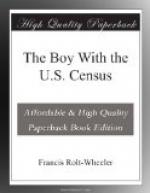“I think I know the reason of that,” volunteered Hamilton. “I heard some census men talking about it, and one of them had spent a long time in Italy. He said that while it was true plenty of the peasants worked in the fields, they usually lived together in villages and went to the fields in the morning. Then the farms are very small,—our average-sized farm here would make five or six of them,—and so the village idea can’t be made to work in this country, and the Italians won’t stand for being separated from the nearest neighbor by a mile or two.”
“I can quite understand that,” the Englishman said thoughtfully; “it would be far less pleasant living in this care-free fashion of ours if one were doing it alone.”
“It may be rather pleasant,” Hamilton admitted slipping back into his pocket the necessary details for the schedule which he had secured from the three men while breakfast was being prepared, “but I think a day or two of it would be enough for me, and I certainly wouldn’t like your end of it, ’Jolly’!”
“Well,” the other replied, as Hamilton strolled over to his mare and lightly swung himself in the saddle, “if I hadn’t done some rustlin’ yesterday you would have gone without breakfast this mornin’ or at least, without this kind of breakfast.”
“And mighty good it was,” the boy replied, “I don’t know when I’ve enjoyed a meal so much. I’m ever so much obliged, boys. Good-by.”
The incident gave Hamilton plenty to think about on the rest of the ride to town, and he found himself genuinely sorry not to have a chance to see more of the three. He could not help admitting to himself that under proper conditions they would be just as fine citizens of the country as any one could be, and the phrase “Nearly all hoboes are Americans” kept running in his head.
He reached the supervisor’s office just as a young fellow, but little older than Hamilton himself was stepping out. He noticed Hamilton’s portfolio and said, a little mischievously, the boy thought:
“How many, if I may ask?”
“Twenty-two hundred and six,” answered Hamilton, rightly supposing the question to refer to the number of people he had enumerated.
The other threw up his hands.
“I pass,” he said, “you beat me by nearly a hundred,” and he laughed and went on, while Hamilton continued on his way to the supervisor’s office. The boy exchanged greetings with his friend, who said:
“I heard you talking with that young chap who just left, when you were coming into the office. Do you know him at all?”
“Not in the least,” replied Hamilton, and he quoted the brief conversation.
“There’s quite a story about that case,” the supervisor said, settling himself back in his chair, “and though I’m as busy as an angry hornet I’ll stop just long enough to tell you. When I was picking the enumerators for the Gullyville district—that’s away at the other end of the section from where you were—I found an unusual number of applicants. At the examination, however, there were two who stood head and shoulders above the rest. One was the principal of a village school, and another was the chap you saw. His name is Wurtzi, and he gave his occupation as a student and his age as nineteen.”




